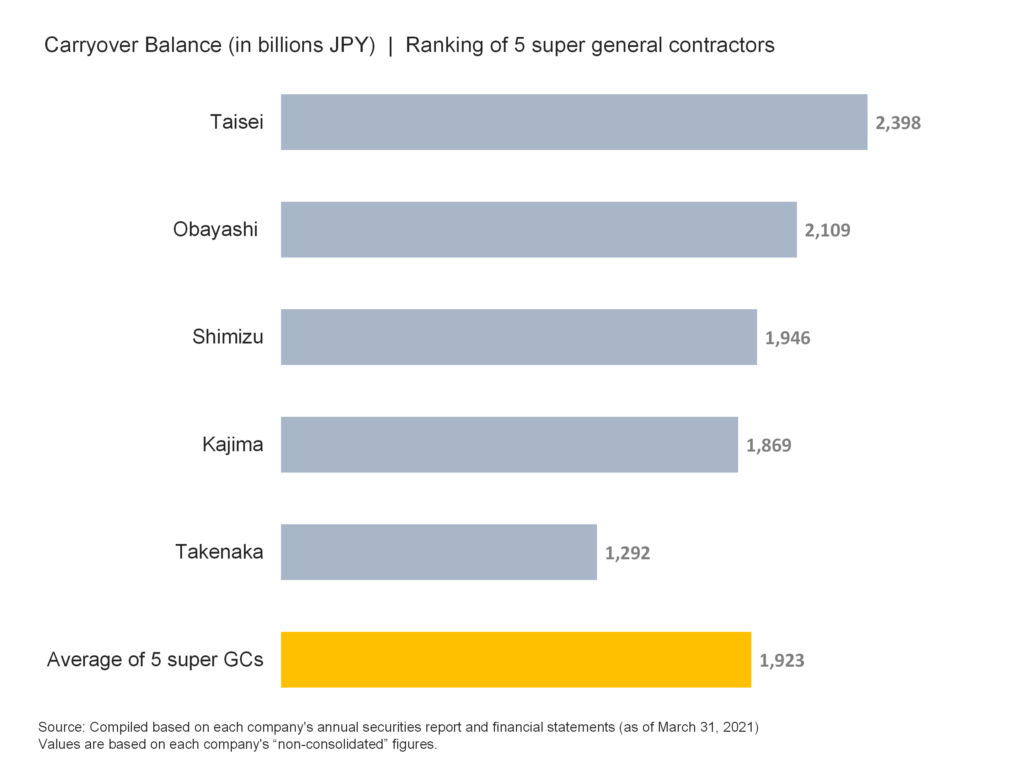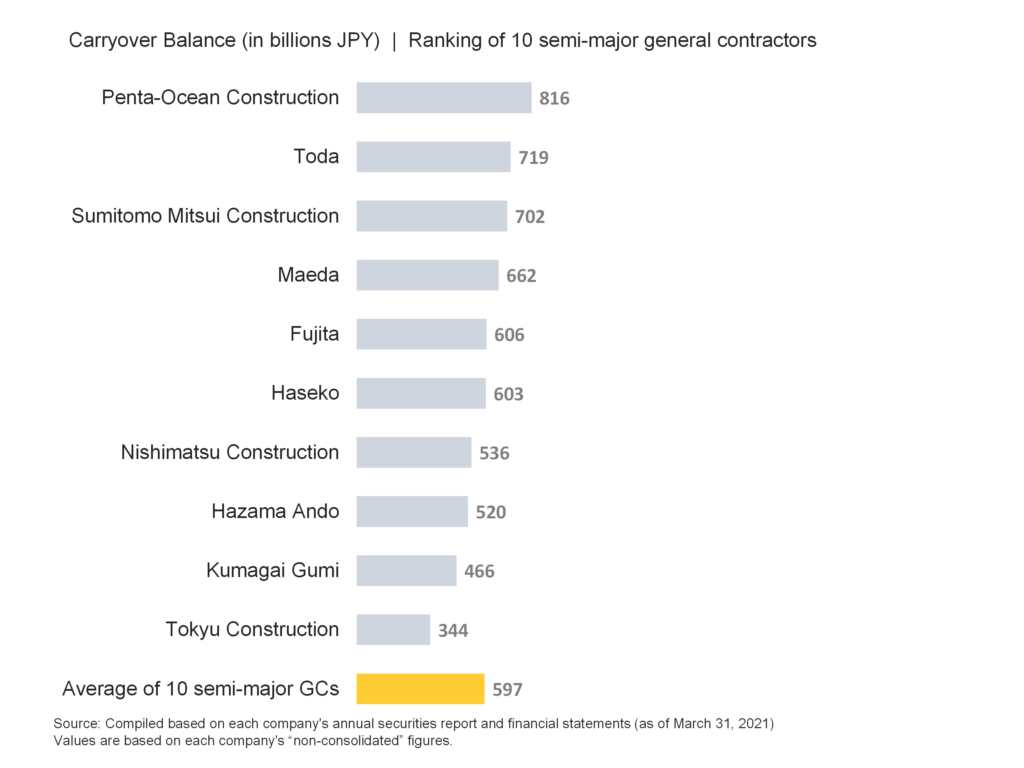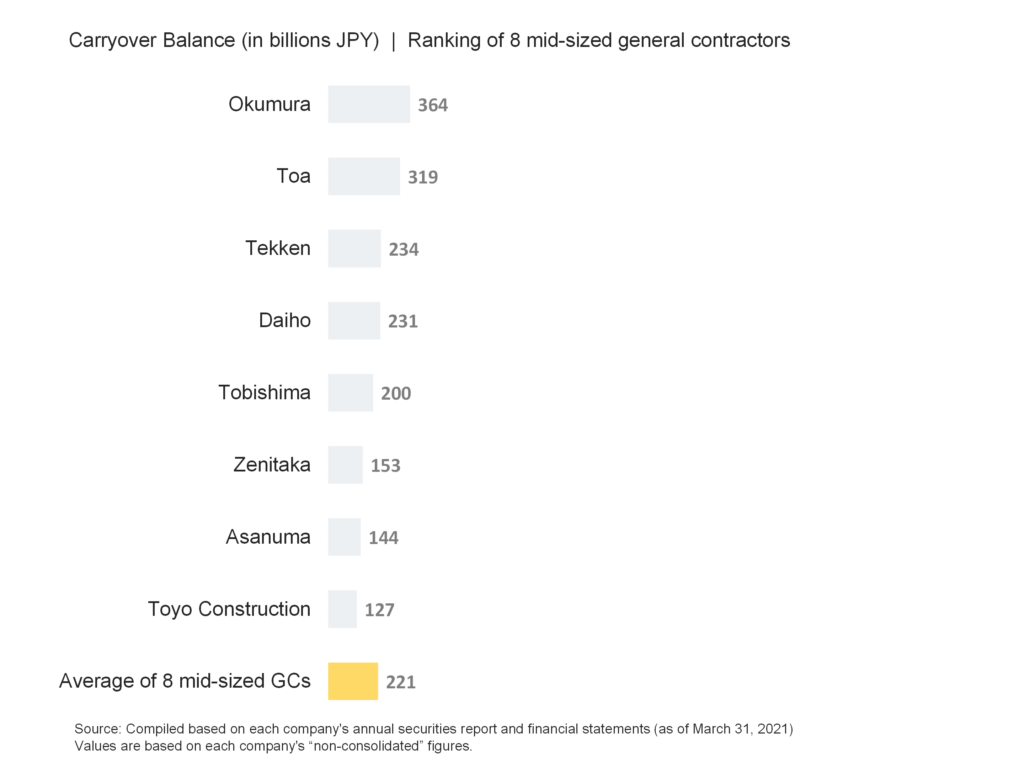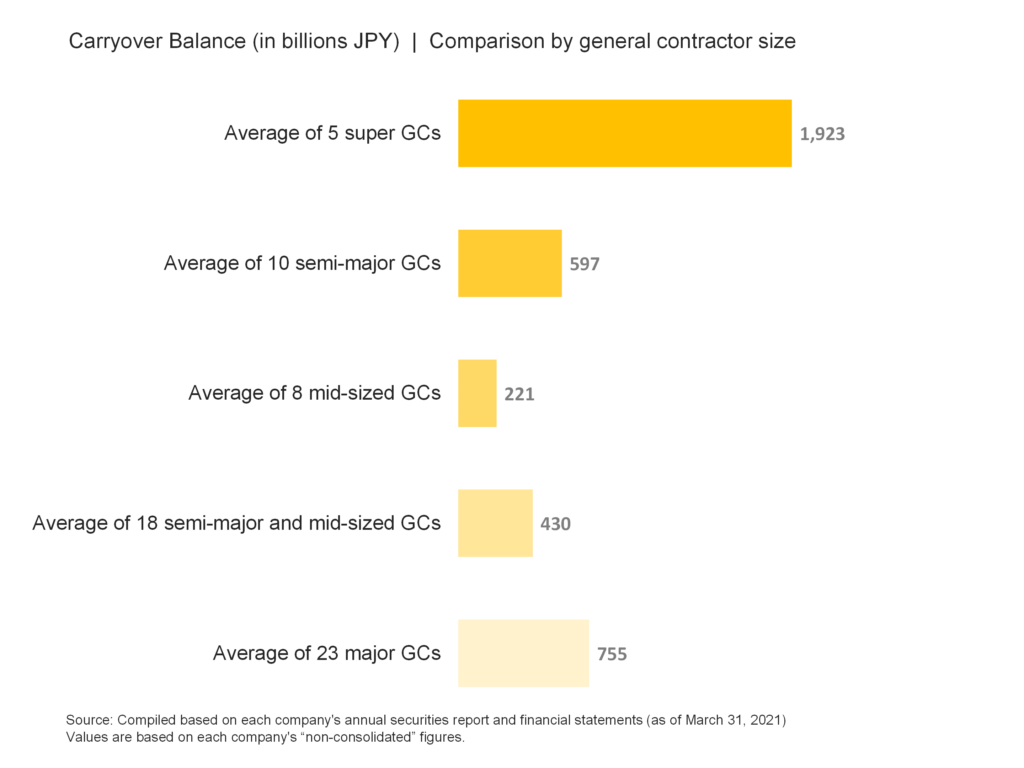Carryover Balance Ranking of 23 Major General Contractors|2021 edition
In this issue of the “State of General Contractors” series, which provides an overview of the status of Japan’s major general contractors based on their business performance, etc., we will introduce the carryover balance rankings (ranking of construction volume on hand) of the 23 major general contractors based on the carryover balance of each company in the fiscal year ending on March 31, 2021.
Considering the fact that general contractors are generally classified according to their company size, we will introduce the following in detail.
- Carryover balance ranking of the 23 major general contractors
- Carryover balance ranking of super general contractors
- Carryover balance ranking of semi-major general contractors
- Carryover balance ranking of mid-sized general contractors
- Carryover balance comparison by general contractor size
1. Carryover balance ranking of 23 major general contractors
First, among the 23 major general contractors, Taisei Corporation was the general contractor with the largest carryover balance at JPY 2.40 trillion. Obayashi Corporation, Shimizu Corporation, and Kajima Corporation followed Taisei Corporation with carryover balances of JPY 2.11 trillion, JPY 1.95 trillion, and JPY 1.87 trillion, respectively. (See figure below)

On the other hand, the general contractor with the lowest carryover amount was Toyo Construction Co., Ltd. at JPY 123.4 billion, followed by Asanuma Corporation, the Zenitaka Corporation, and Tobishima Corporation, which had carryover balances of JPY 126.8 billion, JPY 144.2 billion, and JPY 153.2 billion, respectively. The average of the 23 companies is JPY 754.8 billion.
2. Carryover balance ranking of super general contractors
Next, when looking at the five super general contractors, Taisei Corporation was the super general contractor with the highest carryover balance at JPY 2.40 trillion. This was followed by Obayashi Corporation, Shimizu Corporation, Kajima Corporation, and Takenaka Corporation, which had carryover balances of JPY 2.11 trillion, JPY 1.95 trillion, JPY 1.87 trillion, and JPY 1.29 trillion, respectively. Taisei Corporation and Obayashi Corporation both had carryover balances of over JPY 2 trilion. (See figure below)

The difference in the carryover balance between Taisei Corporation and Takenaka Corporation is more than JPY 1 trillion, indicating that there is a large difference in the carryover balance, even among super general contractors. The average of the five super general contractors is JPY 1.92 trillion, which is an amount that is between the carryover balances recorded by Shimizu Corporation and Kajima Corporation.
3. Carryover balance ranking of semi-major general contractors
Next, a look at the carryover balances of the 10 semi-major general contractors shows that Penta-Ocean Construction Co., Ltd is the semi-major general contractor with the largest carryover balance at JPY 816.3 billion. Toda Corporation, Sumitomo Mitsui Construction Co. Ltd., Maeda Corporation, and Fujita Corporation followed with carryover balances of JPY 718.8 billion, JPY 702 billion, JPY 662.3 billion, and JPY 606.1 billion, respectively. (See figure below)

On the other hand, Tokyu Construction Co., Ltd. was the mid-sized general contractor with lowest carryover balance at JPY 343.6 billion. Kumagai Gumi, Hazama Ando Corporation, Nishimatsu Construction Co., Ltd., and Haseko Corporation followed with JPY 466.2 billion, JPY 519.6 billion, JPY 535.8 billion, JPY 602.6 billion, respectively. The average for the eight semi-major general contractors was about JPY 597.3 billion, which is an amount between the carryover balances recorded by Haseko Corporation and Nishimatsu Construction Co., Ltd.
4. Carryover balance ranking of mid-sized general contractors
Furthermore, looking at the eight mid-sized general contractors, the general contractor with the largest carryover balance was Okumura Corporation with JPY 364 billion. This was followed by Toa Corporation, Tekken Corporation, and Daiho Corporation, with carryover balances of JPY 318.8 billion, JPY 234 billion, and JPY 230.9 billion, respectively. (See figure below)

On the other hand, the Toyo Construction Co., Ltd. was the mid-sized general contractor with lowest carryover balance at JPY 126.8 billion. Asanuma Corporation, the Zenitaka Corporation, and Tobishima Corporation followed with JPY 144.2 billion, JPY 153.2 billion, and JPY 199.6 billion. The average for the mid-sized general contractors was about JPY 221.5 billion, which is an amount between the carryover balances of Daiho Corporation and Tobishima Corporation.
5. Carryover balance comparison by general contractor size
The average carryover balance recorded by the five super general contractors is JPY 1.92 trillion. The average carryover balance recorded by the 10 semi-major general contractors is JPY 597.3 billion. The average carryover balance recorded by the eight mid-sized general contractors is JPY 221.5 billion. This indicates the scale of super general contractors is about 3.2 times larger than that of semi-major general contractors and about 8.7 times larger than that of mid-sized general contractors in terms of average carryover balance. (See figure below)

From the same perspective, the size of semi-major general contractors is about 2.7 times larger than that of mid-sized general contractors. The average of the 18 semi-major and mid-sized general contractors and 23 major general contractors was JPY 430.3 billion and JPY 754.8 billion, respectively.
Reference|Data List
Lastly, the following is a list of the 23 major general contractors and the data used for reference.
list of the 23 major general contractors
Data for Carryover Balance of 23 Major General Contractors
| Company | Carryover Balance (in billions JPY) | General contractor size |
|---|---|---|
| Taisei | 2,397.8 | super general contractors |
| Obayashi | 2,109.2 | super general contractors |
| Shimizu | 1,946.3 | super general contractors |
| Kajima | 1,869.1 | super general contractors |
| Takenaka | 1,292.2 | super general contractors |
| Penta-Ocean Construction | 816.3 | semi-major general contractors |
| Toda | 718.8 | semi-major general contractors |
| Sumitomo Mitsui Construction | 702.0 | semi-major general contractors |
| Maeda | 662.3 | semi-major general contractors |
| Fujita | 606.1 | semi-major general contractors |
| Haseko | 602.6 | semi-major general contractors |
| Nishimatsu Construction | 535.8 | semi-major general contractors |
| Hazama Ando | 519.6 | semi-major general contractors |
| Kumagai Gumi | 466.2 | semi-major general contractors |
| Okumura | 364.0 | mid-sized general contractors |
| Tokyu Construction | 343.6 | semi-major general contractors |
| Toa | 318.8 | mid-sized general contractors |
| Tekken | 234.0 | mid-sized general contractors |
| Daiho | 230.9 | mid-sized general contractors |
| Tobishima | 199.6 | mid-sized general contractors |
| Zenitaka | 153.2 | mid-sized general contractors |
| Asanuma | 144.2 | mid-sized general contractors |
| Toyo Construction | 126.8 | mid-sized general contractors |
| Average of 5 super GCs | 1,922.9 | 5 super GCs |
| Average of 10 semi-major GCs | 597.3 | 10 semi-major GCs |
| Average of 8 mid-sized GCs | 221.5 | 8 mid-sized GCs |
| Average of 18 semi-major and mid-sized GCs | 430.3 | 18 semi-major and mid-sized GCs |
| Average of 23 major GCs | 754.8 | 23 major GCs |
Source: Compiled based on each company’s annual securities report and financial statements (as of March 31, 2021) Values are based on each company’s “non-consolidated” figures.
Comment